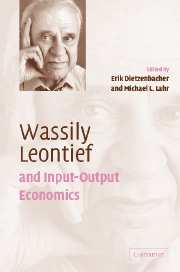Preface
Published online by Cambridge University Press: 22 September 2009
Summary
Wassily Leontief (1905–1999) was the founding father of input-output economics, for which he received the Alfred Nobel Memorial Prize in 1973. Comparisons have been made between Leontief's framework and those developed by other great economists who came before him (e.g. François Quesnay, Karl Marx, Léon Walras and Ladislaus von Bortkiewicz). By making input-output an inherently large-scale empirical work, however, Leontief clearly distinguished his contribution from those of his “predecessors.” While most economists of respected the mathematical rigor of his new system, Leontief took greatest pride in input-output's empirical grounding. Indeed, throughout his career Professor Leontief periodically admonished his colleagues John Maynard Keynes) for overemphasizing mathematical and theoretical elegance at the expense of empirical verification.
Since his path-breaking contribution in 1936, input-output analysis has become a major tool in quantitative economics. In addition to creating its own set of followers, input-output analysis helped to revive classical Ricardian and Marxian theories and inspired the analysis of the linear production systems used in neo-Walrasian theory. Input-output tables and techniques continue to be used widely to analyze all economic and policy issues. They are important in many subdisciplines of economics, such as economics of growth, economics of trade, development economics, energy and environmental economics, labor economics, regional science, structural economics, and national accounting. Input-output studies are important not just for academic economists but also for business analysts, policy-makers and consultants. Over sixty nations have current input-output accounts of their economies.
- Type
- Chapter
- Information
- Wassily Leontief and Input-Output Economics , pp. xix - xxiiPublisher: Cambridge University PressPrint publication year: 2004



